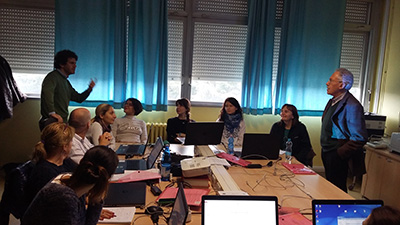 The main topics discussed during the training were:
The main topics discussed during the training were:
* Counseling and diagnostic skills for hereditary cancers, including:
- introduction to protocols and clinical paths
adopted in the cancer genetics clinic
- participation in discussion and genetic
counselling of 18 cases at the units of Medical
Genetics, Medical Oncology and at the Bellaria
Hospital
- Participation into the clinical meeting and the
joint clinical&lab meeting, and genetic testing
for cancer predisposition
* WES lab procedures:
- introduction to sample enrichment for exome and target gene analysis
- the Nextera approach
- DNA fragmentation and first PCR
- PCR purification and first hybridization Second capture and clean-up
- Second PCR and purification
* Bioinformatics analyses of raw data:
- Genome and Exome sequencing
- basis of Exome Analysis: annotation, filtering and prioritization
- application to dominant and recessive Mendelian models: identification of pathogenic mutations
- application to trio (de novo) and ROH analysis
- incidental Findings in Exomes
- non coding mutations
- identification of CNVs in Exomes
- clinical exomes sequencing
Importantly, the training included lectures provided by invited speakers The bioinformatics training will be centered on analysis of whole exome sequencing, in which the Unibo staff has validated experience. Sequencing technology and analysis evolve rapidly, and new approaches are being developed continuously towards a better understanding of the mechanistic functions of our genome. The training included lectures provided by invited speakers who are recognized young scientists in this field and are pioneering novel applications of bioinformatics analysis of the genome in human disease genetics. Christian Gilissen introduced whole genome sequencing in the characterization of intellectual disability, as reported in his Nature's publication in 2014. Malte Spielmann is exploring the contribution of non-coding variation in human genetic syndromes, and has been a chair-person of a session at the last ASHG meeting on this topic. The possibility of having these speakers at the course was regarded as an added value for participants.
Training Agenda